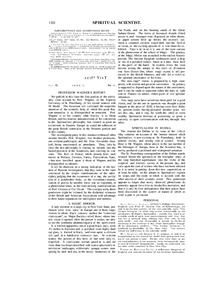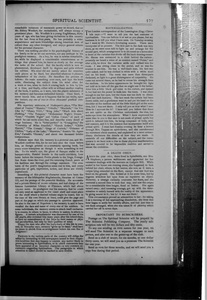< A Phenomenal Memory (continued from page 3-217) >
had any power of expunging ideas which were no longer needed, so that room might be made for more valuable matter.” He concluded that to some extent, this might be done.
John Locke’s notion was that the impression of ideas upon the memory mainly depends upon pleasurable or painful emotions, but such a theory seems hardly of universal applicability. It is the common experience of us all, that the mind frequently retains only one of a whole series of events, while the rest are apparently totally obliterated; or, a single passage in a book stays by us forever, while all the others, of which many may be more interesting and striking, are not retained. Often the moat trivial occurrences of childhood constantly recur, and the most important are forgotten.
Mr. Harris thinks that conscience may “be defined to be a species of memory," in which I hardly agree with him: for, as I apprehend, memory is a function of the mind, while conscience is an attribute of the spirit. In other words, memory is the record of the court; conscience the judge who prescribes the law of action. Memory stores up the eternal experiences of the earth-life; while conscience is the divine, inward monitor, breath of the Eternal Wisdom and Justice, type of His own attributes, and, when not stilled, is infallible.
I shall not however, indulge myself in the digressions suggested by this tempting theme, but speak of the case in point, to which the caption so justly applies. Among the most remarkable instances of mnemonic power on record, that of Mr. Sidney Woollett, the recitationist, will always occupy a prominent place. Mr. Woollett is a young Englishman, thirty years of age, who has been giving recitations in this country for the last three or four years. He has probably a wider acquaintance and more friendships among American men of culture than any other foreigner, and enjoys general esteem for his personal character.
There was nothing peculiar in the psychological history of his family so far as we can ascertain, nor any antitype to his prodigious memory. As a boy, he was in nowise remarkable, for, while he displayed a considerable retentiveness as to things that pleased him, he learnt as slowly as the average the tasks of the school. But the faculty which is now so phenomenal, developed itself by degrees and quite without his volition. His mind did not merely select for retention such pieces as he liked, but absorbed whatever it pleased, independent of his choice. He describes the process as follows: He reads something over once, and lays the book aside, dismissing the subject from his mind often for a week or two, when he finds it coming back to him by bits at a time, and finally, either with or without another reading of the book, it settles, as it were, into the plastic substance of his memory and becomes embedded forever. Once fixed, it never leaves him, and so it happens that he can recite, upon the instant, any one of two or three thousand poetical compositions.
His repertory embraces, of Shakspere’s plays, “The Merchant of Venice,” “Hamlet,” “Othello,” “Macbeth,” “As You Like It,” “Henry VIII.,” “King John,” “Much Ado about Nothing,” “The Tempest,” “Midsummer Night’s Dream,’’ “Lear,” “Twelfth Night” and “Julius Caesar,” of each of which he can recite every line, and describe every detail of stage business. He is “letter-perfect” in “Evangeline,” the “Courtship of Miles Standish,” “Enoch Arden,” “Childe Harold,” “The Corsair,” “Siege of Corinth,” “Prisoner of Chillon,” “Lady of the Lake,” “Mannion,” Keats's “St. Agnes Eve,” Parnell’s “Hermit,” and about two thousand briefer compositions.
Holmes says that his memory is a pictorial one, and Mr. Woollett confirms this, for he not only sees the lines before him, as though printed on a constantly opening book, but every scene transpires as though it were something in real life. To his mind’s eye, the ghost of Banquo stalks to the banquet-table, Hamlet broods in the castle corridors, Lear bows before the tempest, Portia pleads to the Doge, Evangeline floats down the river, and the returning Enoch peers at his faultless one through the cottage casement. The creatures of the poet’s imagination seem real to him, and every particular of gait, expression, action, and dress are vividly reproduced.
Something of this pictorial character must have been the memory of the bibliopolist Magliabecche, librarian of Cosmo III, and the protege of the powerful Medicis. He accumulated a private library of 20.000 volumes, and had charge of the famous Laurentian Library at Florence, which had about 125.000 more. So prodigious was his memory, that he could not only send an applicant to the exact shelf and exact place on the shelf where a desired volume might be found, but in the case of his own library, at least, could give the page and part of the page on which any passage in question appeared. So also in the case of Napoleon I, his memory is said to have recalled the face and name of every one of his soldiers. In some individuals, the memory seems to attach itself exclusively to events, in others to faces, in others to names, in others to figures. A certain schoolmaster was discovered by one of his old pupils, who revisited him many years after his school-days, to have no remembrance of the boys by their names or physical peculiarities, but only by their qualities of mind.
Happy the man who after the hurly-burly of this life is over, and, as Macaulay says, memory “gives up its dead,” shall have no cause to shrink from an arraignment before his own Bar of Judgment!
A Magic Mirror
A lady resident in a large city in New York State, purchased some time since in Europe one of those magic mirrors in whose black concave surface the “conscious clairvoyant”, as Major Buckley called those, whose interior vision is opened while the person it awake, are able to see the wonderful phantasmagoria of the spirit-world.
It is formed apparently out of a great black onyx, some 15- inches in diameter and is polished more highly than cut glass, is framed in black, and rests upon a crimson silk pad in a handsome morrocco case. At a recent seance the powers of this bowl of fate were fully exemplified. A clairvoyant woman gazed at it, and for more than two hours described with scarce a moment’s intermission landscapes, emblematic groupa, scenes transpiring by land and sea, in the snowy fastnesses of the Far North, and on the burning sands of the Great Sahara Desert. The forms of deceased friends flitted across it, and messages were displayed on white sheets, or paper screens held up before the seeress’s eye. Anon a mounted cavalier would dash into the field of vision, or the exciting episode of a lion chase be exhibited. Take it all in all it is one of the most curious of the phenomena of the school of Magic. The potency of the Magic Mirror was avouched in the earliest historic periods. The Ancient Egyptian soothsayers used a drop of ink in a polished metalic basin or a dark fluid held in the palm of the hand. In modern times the most famous among the adepts in this form of divination was from Doctor Dee, whose magic crystal is still preserved in the British Museum, and who fell a victim to the ignorant intolerance of his times.
The true magic mirror, is prepared by a high caste priest, with solemn and peculiar ceremonies. Its potency is supposed to depend upon the nature of the ceremonies, and it may be made to represent either the dark or light side of Nature—to attract either good or evil spiritual influences.
Very large sums have sometimes been paid for a good mirror, and for the one in question was thought a great bargain at the price of $250, it having come from India. Its present owner having procured another glass will sell this one, and it may be worth the while of some wealthy Spiritualist desirous of possessing so great a curiosity to open communication with her, through this office.
A Death Omen
About year 1611, there lived in Spitalfields, one Mrs. Stephens, a person well-known and inspected for her extensive dealings with the mercers on Ludgate Hill. While seated in her house one evening alone, she happened to look behind her chair, where, to her horror, she saw, as it were, a corpse lying extended on the floor, except that one foot was fixed on the ground. She looked at it for some time, but by degrees withdrew her eyes from so repulsive an object, However, a strange curiosity overcame her fears, and she ventured a second time to look that way, and saw the corpse for a considerable time longer, Axed as before. She again turned away; and resuming courage, got up with the determination to satisfy herself with the reality of the appearance, by going nearer to it; but lo! it was not there!
This circumstance proved an admonition to her: for taking it as a warning of her approaching dissolution, she from that hour began to settle her worldly affairs, and had just time to see them arranged, when she was taken ill of pleurisy which carried her off in seven days.
Editor's notes


